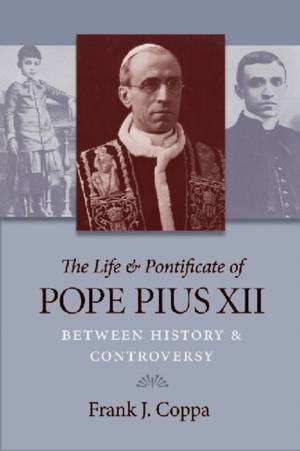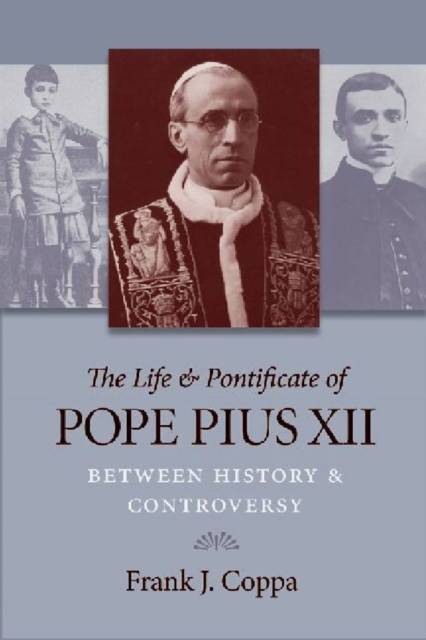
- Retrait gratuit dans votre magasin Club
- 7.000.000 titres dans notre catalogue
- Payer en toute sécurité
- Toujours un magasin près de chez vous
- Retrait gratuit dans votre magasin Club
- 7.000.0000 titres dans notre catalogue
- Payer en toute sécurité
- Toujours un magasin près de chez vous
The Life & Pontificate of Pope Pius XII
Between History and Controversy
Frank J CoppaDescription
Eugenio Pacelli, Pope Pius XII, is one of the most studied but least understood popes of the twentieth century while his pontificate remains the most turbulent and controversial. Although there is a general consensus that he faced serious problems during his tenure--fascist aggression, the Second World War, the Nazi genocide of the Jews, the march of communism, and the Cold War--there is disagreement on his response to these developments. Applauded by some as an "apostle for peace" for his attempt to prevent the outbreak of war, he has been denounced by others as an "advocate of appeasement" for this same effort. Praised by both Christian and Jews for his "Crusade of Charity" during the war, he was denounced by many for his "silence" during the Holocaust. These conflicting interpretations, dubbed the Pius Wars, are often narrow in focus, lack objectivity, and have shed more heat than light.
Written by one of the foremost historians of Pius XII, the present biographical study, unlike the greater part of the vast and growing historiography of Pope Pius XII, is a balanced and nonreactive account of his life and times. Its focus is not on the pope's silence during the Holocaust, though it does address the issue in a historical and objective framework. This is a biography of the man as well as the pope. It probes the roots of his traditionalism and legalism, his approach to modernity and reformism in Church and society, and the influences behind his policies and actions.
This book is the first biography of Eugenio Pacelli to appear in English since the opening of the papers of the pontificate of Pius XI (1922-1939), in which Pacelli served as nuncio to Germany and secretary of state, along with the publication of the memories of figures close to Papa Pacelli.
ABOUT THE AUTHOR:
Frank J. Coppa is the first recipient of the Lifetime Distinguished Scholarship Award of the American Catholic Historical Association and professor of history and the director of doctoral studies in modern world history at St. John's University. He has published widely in the areas of modern Europe, modern Italy, and papal history. His more recent works include The Papacy, the Jews, and the Holocaust; Politics and Papacy in the Modern World; The Policies and Politics of Pope Pius XII; Controversial Concordats: The Vatican's Relations with Napoleon, Mussolini, and Hitler; and the Encyclopedia of Modern Dictators.
PRAISE FOR THE BOOK:
"This book adds a great deal to what we currently know about this most written about pope. Frank Coppa introduces a number of principles which need to be discussed by experts and also by biographers of this pope, most importantly the concepts of papal impartiality and anti-Judaism as related to Pope Pius XII."--Charles R. Gallagher, S.J., assistant professor of history, Boston College
"This is a balanced and highly nuanced biography of Eugenio Pacelli that examines the whole life and times of the man. Frank Coppa has examined the considerable, publicly available, historical record on Pacelli, placed the war years and the Holocaust in the broader scope of Pius XII's life, and brought much needed attention to the oft-neglected pre-1939 and post-1945 years of this complex, enigmatic and intriguing man."--Paul O'Shea, co-director of the Australian Institute for Holocaust and Genocide Studies, Sydney
"These books approach the wartime pontiff with such a clear mastery of the arguments that both Pius's supporters and his denigrators will find it difficult in the future to expect any serious student to accept the hoary myths that have clouded or exalted that pontiff's reputation . . . Coppa opens both books with the statement that Pius is the most studied but least understood of modern pontiffs. His books will go a long way toward changing that perception." --The Catholic Historical Review
"A refreshingly balance
Spécifications
Parties prenantes
- Auteur(s) :
- Editeur:
Contenu
- Nombre de pages :
- 336
- Langue:
- Anglais
Caractéristiques
- EAN:
- 9780813220154
- Date de parution :
- 07-02-13
- Format:
- Livre relié
- Format numérique:
- Genaaid
- Dimensions :
- 142 mm x 213 mm
- Poids :
- 544 g

Les avis
Nous publions uniquement les avis qui respectent les conditions requises. Consultez nos conditions pour les avis.






